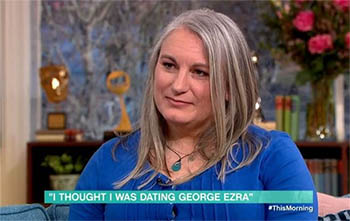Woman scammed after crook claims he is George Ezra – In The News
A woman was scammed online after a cyber-crook led her to believe they were the singer George Ezra and that the pair were in an online relationship.
As they so often do, this particular story starts on social media. Facebook to be specific. Divorced mother Helen from the UK was posting an innocent comment on a post published by the official George Ezra Facebook page. After making the comment, she received a reply from George Ezra’s “official fan page” asking her to send the page a direct (private) message.
After doing so, Helen told ITV’s This Morning program that she received a friend request from George Ezra himself, and the pair began an online relationship, messaging each other over the social network daily.
Classic hallmarks on an online romance scam
From there, the scam operated as nearly every other online romance scam operates. After communicating for some time, “George” began confessing his love, even expressing an openness to marriage, as well as fabricating a number of stories designed to lure Helen into handing over her personal details. “George” formulated a number of excuses why he couldn’t speak to Helen over the phone, including the claim that he was frequently “in the recording studio”.
And finally the crux of the main scam manifested. “George” told Helen that the only way the pair could meet face to face without raising the suspicions of the press would be through an official meet-and-greet, but Helen would have to fork over a whopping £5,000 (later bumped down to £2,500) for the pleasure.
Thankfully for Helen, with the help of her daughter, she didn’t fall for the scam and the penny finally dropped. She hadn’t been speaking to George Ezra at all, and the “official George Ezra fan page” that had initially sent her a reply asking her to send them a private message had been created by cyber-crooks, as too was the George Ezra Facebook profile that sent Helen a friend request.
Sponsored Content. Continued below…
The logic of absurd online scams
To many, this will seem like an absurd scam that could only possibly manage to fool an incredibly low percentage of online users. However as we have previously explained in relation to “Nigerian Prince” email scams, that is exactly the intention. Such online scams are deliberately “obvious” since cyber-crooks wants to attract online users who are more vulnerable to online scams and thus “easy marks”.
The logic behind this is that if a scam is obvious or audacious enough, those few who do take the bait have already shown themselves to be susceptible enough to be potential marks. In contrast, more sophisticated or subtle scams may result in an increase in would-be victims initially taking the bait, but such victims are more likely to recognise the scam and leave, meaning the crook is likely to waste more of their time on failed scams as a result.
The bottom line is callously indelicate – obvious scams yield more vulnerable victims.
Follow-up scams
Unfortunately, online romance scams are often used alongside other scams, and even if would-be victims manage to sidestep the main scam, follow-up scams are never too far behind.
In Helen’s case, the personal information the fake “George” had managed to squeeze from her was used to commit identify theft as crooks were applying for financial loans in her name.
Additionally crooks also attempted to use the “safe account” scam, whereby scammers pretend to represent either law enforcement or the victim’s bank to try and trick a victim into transferring their money to a “safe bank account” which in reality is a bank account belonging to scammers.
In Helen’s case, crooks pretended to be from Scotland Yard told Helen she had been a victim of a worldwide money laundering scheme and that the money in her bank account was at risk unless she transferred it all to a “safe account”.
Sponsored Content. Continued below…
The hallmarks of a typical scam
Persuading a victim that you’re a famous singer, and tricking them into believing they’ve entered some type of online relationship is certainly not the typical scam. But once we strip that fact away, this scam is actually just your typical online romance scam, with all the usual hallmarks, including –
- Initiated by replying to a comment on a public Facebook post
- Requesting personal information from the victim
- Declaring their love over the Internet without meeting in person
- Demanding their communication remain private
- Fabricating excuses why they cannot meet in person
- Pleading for the victim to send them money over the Internet
- Emotional manipulation
- Follow up scams including identity theft and the “safe account” scam
You can read more about online romance scams and how they work in our post here.
Keep up-to-date with all our latest articles. Follow us on Facebook, Instagram and Twitter.
Continued below...
Thanks for reading! But before you go… as part of our latest series of articles on how to earn a little extra cash using the Internet (without getting scammed) we have been looking into how you can earn gift vouchers (like Amazon vouchers) using reward-per-action websites such as SwagBucks. If you are interested we even have our own sign-up code to get you started. Want to learn more? We discuss it here. (Or you can just sign-up here and use code Nonsense70SB when registering.)
Become a Facebook Supporter. For 0.99p (~$1.30) a month you can become a Facebook fan, meaning you get an optional Supporter Badge when you comment on our Facebook posts, as well as discounts on our merchandise. You can subscribe here (cancel anytime.)


